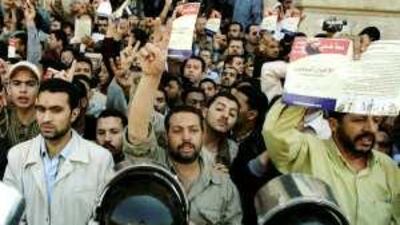CAIRO // A fatwa that surfaced recently prohibiting membership in political Islamic groups has caused an outcry in Egypt and has raised the matter of who has the right to issue the religious rulings. Opponents of the latest fatwa claim it was made for political reasons and targets such groups as the Muslim Brotherhood, Hamas and Hizbollah at a time of tension between them and a number of Arab governments in the aftermath of the Israeli military offensive in Gaza.
"Belonging to groups that have their own political and military agendas, that are different from those of the Umma [Islamic community], whose allegiance is to their leader and who would fight fellow Muslim brothers if ordered to, is prohibited, whether they follow a political or military path," reads the fatwa, which appeared this week on the website of Dar al Iftaa, an authoritative fatwa-issuing body in Cairo.
Mohammed Habib, deputy leader of the Muslim Brotherhood, said the ruling was "provocative". "The fatwa and its timing is proof of the attempt to besiege the role of Islamic groups and scare citizens from joining them, and cast doubt on their humanitarian and social roles," Mr Habib said. Ibrahim Negm, media adviser at Dar al Iftaa, said the fatwa was not new and he did not know why it had resurfaced recently.
"I think it had to do with belonging to al Qa'eda, not Islamic groups in general," he said. Still, the incident has once more shone the spotlight on the purpose and value of fatwas and who has the right to issue them. Over the past 10 years, several Egyptian and Arab preachers who are not graduates from Al Azhar, the highest institute in Sunni Islam, have become popular across the Middle East. Dar al Iftaa was originally the main source of fatwa issuing along with Al Azhar, but so called "media fatwas" dished out on satellite channels and by phone have grown.
Moustafa el Gendi, an independent Egyptian lawmaker, said he was furious over the misuse of fatwas in recent years and has presented a draft law to parliament that would jail - for up to three years - those who issue fatwas without the required credentials. "We are suffering from satellite fatwas and provocations; we are going through very critical times in a volatile region, and we need unity not divisions," said Mr el Gendi, adding he was also angered by Hassan Nasrallah's call for Egyptians to rise up and force their government to open the Rafah crossing on the border with Gaza.
To issue a fatwa, he said, an individual would have to have a permit granted by a committee from Al Azhar, Dar al Iftaa and a judge from a cassation court. "I am sick and tired of inflammatory fatwas and opinions by preachers and politicians on Arab Satellites." Sheikhs of Al Azhar and Dar al Iftaa, who are appointed by the Egyptian president and are often accused of towing the official line, refer to the phenomenon as "Fatwa chaos".
But many preachers oppose Mr el Gendi's law, which is expected to be discussed soon, saying it is against freedom of thought, a cornerstone of Islam and Islamic jurisprudence. "I'm against this law and any law that aims at limiting the freedom of opinion, thinking and expression," said preacher Safwat Hegazy. "This law aims to control Muslims' minds via official clerics. It's a kind of security and police interference in God's religion."
Mr Hegazy, a well-known and controversial satellite preacher, has his own show on el Nas, a Saudi religious channel. In 2006 he issued a fatwa urging the killing of Israelis during the summer war in Lebanon. Others agree with restricting the right to issue fatwas but say the current politicisation of the rulings stems from a deeper social problem. "Issuing laws is not enough to solve the problem of fatwa chaos," said Wael Lutfi, author of New Preacher's State: Preaching, Wealth and Fame.
"If passed, this law, might be useful in limiting the political usage of fatwas, but it won't solve the crisis of a society that is seeking fatwas for everything." In any case, Mr Negm denied that Dar al Iftaa or other official religious bodies had any thing to do with the proposed law. "There is no fatwas chaos, there is chaos in Islamic discourse, which is more dangerous," Mr Negm said. "We are trying to have a corrective and preventive role."

